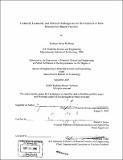Technical, economic, and clinical challenges to the development of new biomaterials-based vaccines
Author(s)
Huffman, Kathleen Renee
DownloadFull printable version (5.944Mb)
Other Contributors
Massachusetts Institute of Technology. Dept. of Materials Science and Engineering.
Advisor
Darrell J. Irvine.
Terms of use
Metadata
Show full item recordAbstract
Research into novel vaccine methods is becoming increasingly important for the potential treatment of widespread diseases such as cancer, HIV, and malaria. Members of the Irvine laboratory have developed a hydrogel and particle-based injectable vaccine with the potential to treat such diseases. The vaccine aims to elicit a tailored immune response to a particular type of disease so as to destroy infected or cells in the body and/or develop immunological memory for future protection against the disease. The purpose of this paper is to analyze the feasibility of getting such a biomaterials-based novel vaccination method to the market. Topics such as application potential, efficacy, modes of delivery, storage, patent ability, and costs for producing the vaccine are explored. Finally, a suggested business strategy is outlined, through which value can be successfully obtained from the novel vaccine.
Description
Thesis (M. Eng.)--Massachusetts Institute of Technology, Dept. of Materials Science and Engineering, 2005. Includes bibliographical references (leaves 81-87).
Date issued
2005Department
Massachusetts Institute of Technology. Department of Materials Science and EngineeringPublisher
Massachusetts Institute of Technology
Keywords
Materials Science and Engineering.